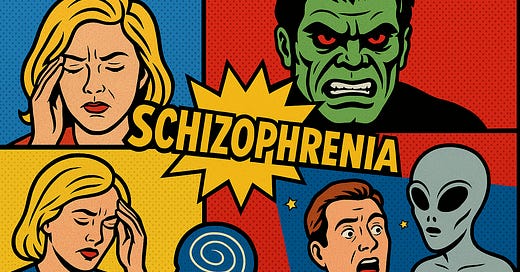Unpacking Schizophrenia: From Personal Reality to Public Perception
Schizophrenia is one of the most misunderstood mental health conditions, often misrepresented in the media and misunderstood in real life. URevolution’s recent trio of articles—"How to help someone with schizophrenia?", "Schizophrenia in the media: depictions of Jekyll or Hyde", and "Raped by aliens”: sexual hallucinations and schizophrenia—offers a layered, compassionate, and brutally honest look at schizophrenia from multiple vantage points: personal, cultural, and clinical.
Together, these pieces form a powerful narrative mosaic that demands we rethink how we talk about—and relate to—this complex condition.
Personal Experience: When Hallucinations Speak the Unspeakable
“'Raped by aliens'” is not an article that shies away from discomfort. Through a raw, first-person narrative, the piece confronts the taboo topic of sexual hallucinations—something rarely addressed in mainstream mental health discourse. The article links early childhood trauma and PTSD to the emergence of psychosis in adulthood, particularly the intersection of dissociation and schizophrenia. It brings much-needed visibility to how schizophrenia manifests in real lives—not as a violent spectacle, but as private suffering.
This narrative is in direct contrast with how schizophrenia is often portrayed publicly, leading us to the second piece in the series.
Media Mythology: Schizophrenia as the Villain
In "Schizophrenia in the media: depictions of Jekyll or Hyde", URevolution pulls apart decades of cinematic and television tropes. The article critiques how media representations lean heavily on the Jekyll-and-Hyde archetype—painting people with schizophrenia as violent, unpredictable, or monstrous.
This is not merely a narrative flaw; it's a public health issue. Misrepresentation perpetuates stigma, discourages treatment-seeking, and fuels social alienation. Studies confirm that these portrayals can shape public attitudes more than scientific facts or lived experience【source】.
The media article acts as a cultural diagnosis—revealing how fictional portrayals of schizophrenia deepen real-world misunderstanding and fear.
Compassion in Action: How to Help Someone with Schizophrenia?
While the first two pieces explore the personal and societal challenges of schizophrenia, "How to help someone with schizophrenia?" delivers a practical roadmap. It begins with the most important step: education. Recognizing early signs, validating the person’s reality without feeding into delusions, and supporting medical treatment are all key strategies.
This article goes further by addressing the emotional labor involved in supporting someone with schizophrenia. From building trust to recognizing caregiver burnout, it provides an empathetic, actionable guide. Organizations like NAMI (National Alliance on Mental Illness) and the Hearing Voices Network are also recommended resources【source】【source】.
A Shared Thread: Humanizing the Condition
What unites these articles is a shared insistence on humanizing schizophrenia—not romanticizing it, not sanitizing it, but understanding it on its own terms.
The personal account in “Raped by aliens” pushes us to acknowledge symptoms that society avoids.
The media analysis reveals how fictional depictions contribute to the real-life marginalization of people with schizophrenia.
The practical guide shows us how to help someone with schizophrenia. It is more than an act of kindness—it’s a form of advocacy.
Together, these articles create a necessary balance between compassion, critique, and clarity.
Beyond Labels, Toward Understanding
Schizophrenia is not a monolith. It's not just delusions, hallucinations, or media horror plots. It's people—navigating internal chaos in a world that too often meets them with fear or dismissal. URevolution’s coverage reminds us that the most revolutionary act we can take is to listen, learn, and let go of stigma.
Let these stories challenge you. Let them soften the hard edges of assumption. And above all, let them move you to see people with schizophrenia as they are: people first.
.





